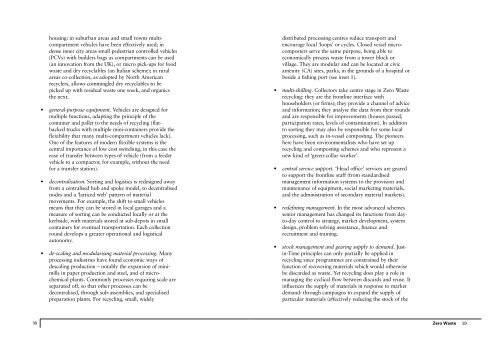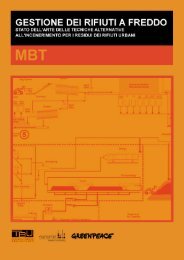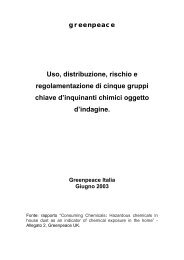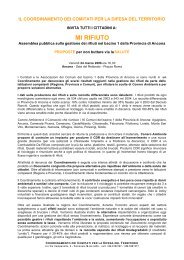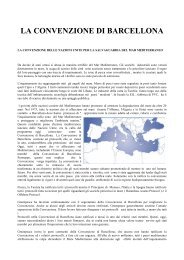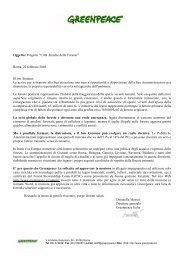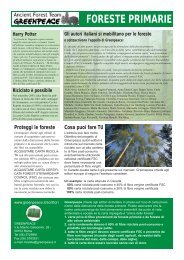Zero Waste by Robin Murray, Greenpeace Environmental Trust 2002
Zero Waste by Robin Murray, Greenpeace Environmental Trust 2002
Zero Waste by Robin Murray, Greenpeace Environmental Trust 2002
Create successful ePaper yourself
Turn your PDF publications into a flip-book with our unique Google optimized e-Paper software.
housing: in suburban areas and small towns multic<br />
o m p a rtment vehicles have been effectively used; in<br />
dense inner city areas small pedestrian controlled vehicles<br />
(PCVs) with builders bags as compartments can be used<br />
(an innovation from the UK), or micro pick-ups for food<br />
waste and dry recyclables (an Italian scheme); in ru r a l<br />
a reas co-collection, as adopted <strong>by</strong> North American<br />
recyclers, allows commingled dry recyclables to be<br />
picked up with residual waste one week, and org a n i c s<br />
the next.<br />
• general-purpose equipment. Vehicles are designed for<br />
multiple functions, adapting the principle of the<br />
container and pallet to the needs of recycling (flatbacked<br />
trucks with multiple mini-containers provide the<br />
flexibility that many multi-compartment vehicles lack).<br />
One of the features of modern flexible systems is the<br />
central importance of low cost switching, in this case the<br />
ease of transfer between types of vehicle (from a feeder<br />
vehicle to a compactor, for example, without the need<br />
for a transfer station).<br />
• d e c e n t r a l i s a t i o n. Sorting and logistics is redesigned away<br />
f rom a centralised hub and spoke model, to decentralised<br />
nodes and a ‘latticed web’ pattern of material<br />
movements. For example, the shift to small vehicles<br />
means that they can be stored in local garages and a<br />
m e a s u re of sorting can be conducted locally or at the<br />
kerbside, with materials stored at sub-depots in small<br />
containers for eventual transportation. Each collection<br />
round develops a greater operational and logistical<br />
a u t o n o m y.<br />
• de-scaling and modularising material processing. M a n y<br />
p rocessing industries have found economic ways of<br />
descaling production – notably the expansion of minimills<br />
in paper production and steel, and of micro -<br />
chemical plants. Commonly processes requiring scale are<br />
separated off, so that other processes can be<br />
decentralised, through sub-assemblies, and specialised<br />
p reparation plants. For recycling, small, widely<br />
distributed processing centres reduce transport and<br />
encourage local ‘loops’ or cycles. Closed vessel micro -<br />
composters serve the same purpose, being able to<br />
economically process waste from a tower block or<br />
village. They are modular and can be located at civic<br />
amenity (CA) sites, parks, in the grounds of a hospital or<br />
beside a fishing port (see inset 1).<br />
• m u l t i - s k i l l i n g. Collectors take centre stage in <strong>Zero</strong> Wa s t e<br />
recycling: they are the frontline interface with<br />
householders (or firms); they provide a channel of advice<br />
and information; they analyse the data from their ro u n d s<br />
and are responsible for improvements (houses passed,<br />
p a rticipation rates, levels of contamination). In addition<br />
to sorting they may also be responsible for some local<br />
p rocessing, such as in-vessel composting. The pioneers<br />
h e re have been environmentalists who have set up<br />
recycling and composting schemes and who re p resent a<br />
new kind of ‘green-collar worker’.<br />
• central service support . ‘Head office’ services are geare d<br />
to support the frontline staff (from standard i s e d<br />
management information systems to the provision and<br />
maintenance of equipment, social marketing materials,<br />
and the administration of secondary material markets).<br />
• redefining management. In the most advanced schemes<br />
senior management has changed its functions from dayto-day<br />
control to strategy, market development, system<br />
design, problem solving assistance, finance and<br />
re c ruitment and training.<br />
• stock management and gearing supply to demand. Justi<br />
n - Time principles can only partially be applied in<br />
recycling since programmes are constrained <strong>by</strong> their<br />
function of recovering materials which would otherw i s e<br />
be discarded as waste. Yet recycling does play a role in<br />
managing the cyclical flow between discards and reuse. It<br />
influences the supply of materials in response to market<br />
demand: through campaigns to expand the supply of<br />
p a rticular materials (effectively reducing the stock of the<br />
38<br />
<strong>Zero</strong> <strong>Waste</strong><br />
39


